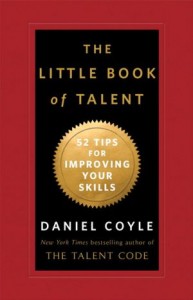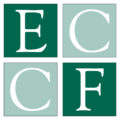Little book of talent: 52 tips for improving your skills
 I’ve had a fascination lately with the subject of performance improvement and the related topics of talent and habit. For anyone genuinely desiring to improve their understanding of how to achieve better performance, Daniel Coyle’s newest book is a small gemstone.
I’ve had a fascination lately with the subject of performance improvement and the related topics of talent and habit. For anyone genuinely desiring to improve their understanding of how to achieve better performance, Daniel Coyle’s newest book is a small gemstone.
Building off of the research that he presented in The Talent Code, which I discussed here in September, Coyle’s newest book offers 52 mostly concise tips for improving your skills in … well, whatever it is that you want to do better.
Coyle divides the tips into three sections entitled: Getting Started, Improving Skills, and Sustaining Progress. Here’s a sampling of what he offers:
Tip #4 Buy a notebook. This is a personal favorite and something that I recommend to my coaching clients. Some call it a journal and write copiously in it each day. But more often, clients keep what I call a databook to record questions, observations, progress, and set-backs. Either way, writing down your thoughts and observations is a sure way to be able to connect the dots later and further the learning.
Tip #6 Choose spartan over luxurious. According to Coyle “… luxury is a motivational narcotic … it whispers, ‘Relax, you’ve made it.’” This is an interesting concept and reminds me of companies that I’ve worked for that provided sales people with offices that were little more than open-air closets. Early in my career, when I questioned the practice, the boss told me, “I want them on the road selling their butts off, not here enjoying a comfy office. That doesn’t make any of us any money.”
Tip #22 Pay attention immediately after you make a mistake. Whenever my cat does something silly, like try to jump up on something only to miss and take a tumble instead, he looks completely indignant. Then he quickly rights himself and walks away nonchalantly as though nothing ever happened.
It’s natural to want to dismiss our mistakes; our pride almost requires it. But according to Coyle that’s the worst thing we can do because people who immediately pay attention to their mistakes learn faster and improve their skills (I don’t know about cats).
Coyle suggests that we, “Take mistakes seriously, but never personally.”
Tip #30 Take a nap. Coyle claims this is one of his favorite tips. I think it is one of mine too. According to Coyle, science says that napping helps us learn.
Tip #32 Make positive reaches. Just before we go for IT, we can choose to focus on what we want to do or what we want to avoid. It is always better to focus on what you want to do. The next time you need to have a difficult conversation with an employee, focus on what you want the outcome to look like, not all ways the conversation could go badly.
Tip #46 Don’t waste time trying to break bad habits – instead, build new ones. Because our brains are better at building circuits than breaking them, focus on the new habit that you’d like to replace the old one. If you want to relate better with your employees and you know you tend to interrupt, don’t worry so much about that. Focus on listening and comprehending what you are being told. Eventually you will build a listening habit which will eclipse the interrupting on.
These are just six tips that appealed to me. Next time, we’ll look at learning soft skills versus hard skills.



Marie – great article. Thank you for sharing this book. I’ve been involved with performance improvement for years and share your interest in habits and talent.
Jacquie
Thanks Jacquie. It’s a fascinating topic. We tend to think of performance improvement as a big ominous organizational initiative and I think there is a huge myth out there that, whether we are talking piano playing or leadership ability, you are just “born with it.” I like that Coyle’s books debunks the latter and puts control for performance improvement into the hands of the individual that desires it with a series of concrete actions that they can take.